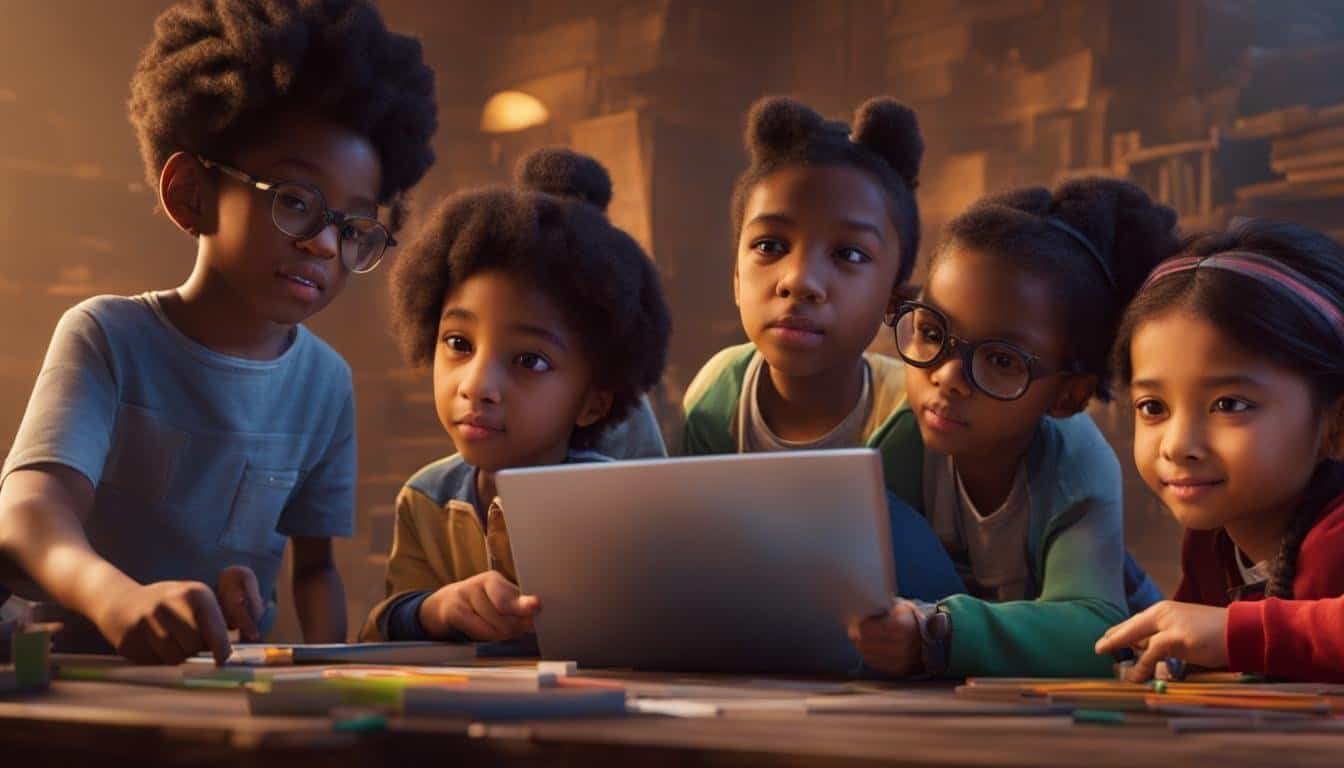Enhance Social Skills for Children with Tips & Games
|
Getting your Trinity Audio player ready...
|
Social skills play a crucial role in a child’s development, influencing their ability to communicate, solve problems, and work collaboratively. Cultivating these skills from an early age sets the foundation for positive interactions with peers and helps children navigate various social situations confidently. In this article, we will explore effective tips and engaging games that can enhance social skills for children, promoting their communication skills, emotional intelligence, teamwork, empathy, assertiveness, listening skills, and conflict resolution abilities.
Key Takeaways:
- Activities and games provide valuable opportunities for children to develop social skills.
- Enhancing social skills contributes to a child’s overall development and future success.
- Communication skills, emotional intelligence, and problem-solving skills are crucial components of social skills.
- Engaging in teamwork activities fosters collaboration, cooperation, and positive social interactions.
- Developing empathy and assertiveness helps children navigate social situations with confidence.
Why Are Social Skills Important for Children’s Development?
Social skills play a critical role in the overall development of children. These skills enable them to navigate social situations, build meaningful relationships, and communicate effectively. Moreover, developing social skills equips children with emotional intelligence, problem-solving abilities, and teamwork, which are essential for their success in various aspects of life—from school to future workplaces.
When children possess strong social skills, they can understand and manage their emotions more effectively. They learn to empathize with others, allowing them to develop deeper connections and express empathy towards their peers. By honing their communication skills, children become adept at articulating their thoughts and ideas, while also actively listening to others.
Problem-solving skills are another crucial aspect of social development. Through social interactions and activities that promote problem-solving, children learn to think critically and find creative solutions. They also develop the ability to work collaboratively and engage in effective teamwork, which is vital for achieving common goals.
It is important to recognize that social skills are not only beneficial for children’s current relationships but also serve as a foundation for their future endeavors. The ability to effectively communicate, work well with others, and navigate conflicts will be invaluable throughout their lives, both personally and professionally.
Activities for Building Communication Skills
Communication skills are a fundamental aspect of social skills for children. It is essential for them to learn how to express themselves effectively and understand others’ perspectives. Engaging in activities that focus on building communication skills can greatly contribute to their overall social development.
The Name Game
The Name Game is a fun and interactive activity that helps children practice both listening and conversation skills. To play this game, children sit in a circle and take turns calling out names.
Child 1: “John!”
Child 2: “Sara!”
Child 3: “Emily!”
Child 4: “Michael!”
…
Through this activity, children learn to listen attentively to each other and respond appropriately. They also get the opportunity to practice conversation skills by taking turns and engaging in simple verbal exchanges.
Charades for Emotional Expression
Playing charades is another effective way to develop communication skills, specifically expressive language and non-verbal communication. In this game, children take turns acting out different emotions without using words, while others guess the emotion being portrayed.
This activity encourages children to communicate through body language, facial expressions, and gestures. It helps them understand the importance of non-verbal cues in conveying emotions and enhances their ability to recognize and interpret these cues in others.
These activities for building communication skills provide children with opportunities to practice listening, conversation, expressive language, and non-verbal communication. By engaging in these interactive exercises, children can improve their ability to effectively communicate their thoughts and emotions, as well as understand and connect with others more empathetically.
Games to Foster Emotional Intelligence
Emotional intelligence plays a critical role in successful social interactions. It helps children recognize, understand, and manage their own emotions, as well as empathize with others. By incorporating games that focus on emotional intelligence, children can develop essential social skills and deepen their understanding of emotions.
One engaging game that promotes emotional intelligence is “Emotion Charades.” In this game, children act out various emotions using facial expressions and body language, while their peers try to guess the emotions being portrayed. This activity not only enhances emotion recognition but also encourages empathy as children experience firsthand the visual cues associated with different emotions.
Another effective game to foster emotional intelligence is “Expression Mimicking Games.” In these games, children take turns mimicking facial expressions of different emotions, such as happiness, sadness, anger, or surprise. By imitating and recognizing these expressions, children develop their emotion management skills and learn how to express their own feelings effectively.
“Emotional intelligence is not only about recognizing and understanding emotions but also about effectively managing and expressing them. By engaging in games that focus on emotion recognition and expression, children can develop strong emotional intelligence, which is crucial for building healthy relationships and navigating social situations.”
Using games that promote emotional intelligence helps children develop greater self-awareness and empathy. These activities provide a safe and enjoyable way for children to explore and understand their emotions, as well as recognize and respond to the emotions of others.
Benefits of Games to Foster Emotional Intelligence:
- Promotes empathy and understanding
- Enhances emotion recognition and management
- Develops effective communication skills
- Fosters self-expression and emotional understanding
Emotional intelligence is a crucial aspect of social skills development. By incorporating games that focus on emotion recognition, empathy, and emotion management, parents and educators can nurture children’s emotional intelligence and help them build strong social connections.
Developing Problem-Solving and Teamwork Skills
Problem-solving and teamwork skills play a vital role in children’s social interactions. These skills enable children to collaborate effectively, think critically, and find creative solutions. By engaging in social skills activities that promote cooperation and collaboration, children can develop problem-solving and teamwork skills that will benefit them throughout their lives.
The Topic Game: Encouraging Brainstorming and Creativity
One example of a social skills activity that fosters problem-solving and teamwork is the Topic Game. In this game, children take turns brainstorming and coming up with words related to a specific category. For instance, if the category is “animals,” children can contribute words like “lion,” “elephant,” and “zebra.” This activity encourages children to think critically, expand their vocabulary, and work together to generate ideas.
Building Games: Promoting Collaboration and Problem-Solving
Another effective activity for developing problem-solving and teamwork skills is Building Games. Whether it’s building structures with blocks, constructing puzzles, or creating art projects, these games require children to work together towards a common goal. By collaborating, discussing ideas, and distributing tasks, children learn essential problem-solving strategies and improve their ability to work as a team.
The image above highlights children engaged in a building game, where they are working together to solve a construction challenge. This activity encourages problem-solving, teamwork, and cooperation among children, contributing to their development of social skills.
“The Topic Game and Building Games provide valuable opportunities for children to collaborate, think critically, and find creative solutions. These activities not only enhance their problem-solving and teamwork skills but also foster positive social interactions.” – Dr. Smith, Child Psychologist
By participating in these problem-solving and teamwork activities, children develop essential social skills that equip them to navigate various social situations. They learn the importance of effective communication, cooperation, and collaboration, setting the foundation for successful interactions throughout their lives.
Cultivating Empathy and Assertiveness
Empathy and assertiveness are crucial skills that contribute to a child’s overall social development. By engaging in specific social skills activities, children can cultivate empathy, perspective-taking, and self-expression, while also learning to assert their opinions respectfully. These activities enable children to navigate social situations with confidence and establish meaningful connections with others.
Activities for Cultivating Empathy
-
Step into Conversation: In this activity, children learn the importance of actively listening to others and understanding different perspectives. They take turns engaging in conversations, expressing their thoughts and feelings while practicing empathy towards their conversation partner. By encouraging genuine dialogue and encouraging empathy, children develop their ability to understand and connect with others.
-
Role-Playing Games: Role-playing activities allow children to step into the shoes of different characters, promoting perspective-taking and empathy. Through role-playing scenarios, such as acting out different emotional situations or assuming the role of a character in a story, children develop a deeper understanding of others’ feelings and experiences.
Fostering Assertiveness and Self-Expression
“Productive Debate: Empowering children to express their opinions and engage in respectful discussions, this activity fosters assertiveness and effective communication. Children learn how to present and defend their viewpoints while considering the perspectives of others. This activity helps them cultivate assertiveness skills and express their thoughts and ideas confidently.”
By combining these social skills activities that focus on empathy and assertiveness, children develop a well-rounded set of skills for effective social interaction. These activities encourage children to consider others’ feelings, express themselves confidently, and navigate social dynamics with empathy and respect.
Teaching Conflict Resolution Skills
Conflict resolution is a critical social skill for children to learn. It equips them with the tools to manage disagreements peacefully, make compromises, and negotiate effectively. By mastering conflict resolution, children develop problem-solving abilities and enhance their communication skills. Engaging in social skills games that encourage conflict resolution allows children to practice these skills in a safe and supportive environment.
One popular game for teaching conflict resolution is “Simon Says.” This game not only enhances listening and following instructions but also provides opportunities for children to navigate conflicts that may arise during the game. When conflicts occur, the game can be paused to discuss resolutions, encouraging children to express their viewpoints and find compromises that satisfy everyone involved.
Another game that promotes conflict resolution is “Scavenger Hunts.” This activity encourages children to work together in teams, fostering collaboration and problem-solving skills. However, conflicts may arise when team members have differing opinions about finding clues or deciding on the next steps. These conflicts provide an opportunity for children to practice negotiation and finding win-win solutions, strengthening their conflict resolution abilities.
Through these social skills games, children learn valuable conflict resolution strategies, such as active listening, understanding others’ perspectives, and communicating assertively. These skills empower children to manage conflicts peacefully, build stronger relationships, and develop problem-solving abilities that extend beyond the game.
Benefits of Teaching Conflict Resolution
“Learning to resolve conflicts is an essential life skill. By teaching children how to effectively handle disagreements, we empower them to navigate challenging situations with confidence and respect for others.” – Dr. Maya Johnson, Child Psychologist
| Benefits of Teaching Conflict Resolution Skills |
|---|
| 1. Improved communication and listening skills |
| 2. Enhanced problem-solving and critical thinking abilities |
| 3. Development of empathy and understanding of others’ perspectives |
| 4. Increased assertiveness and self-expression |
| 5. Strengthened relationships and social connections |
Teaching conflict resolution skills not only equips children with essential tools for resolving conflicts but also nurtures their personal growth and social competence. By empowering children to become effective problem solvers and communicators, we lay the foundation for their success in relationships and future endeavors.
The Benefits of Music and Rhythm Games
Music and rhythm games have proven to be effective in enhancing social behavior in children. Research suggests that joint music-making activities, such as rhythm games, promote cooperation and social skills.
When children participate in music games like “Waking Up the Frogs” with rhythmic elements, they are more likely to engage in cooperative behaviors and work together towards a common goal. Music acts as a unifying force, bringing children together and fostering collaboration, teamwork, and positive social interactions.
Participating in music and rhythm games provides children with opportunities to learn and practice important social skills. By synchronizing their movements and actions with others, children develop a sense of joint responsibility and shared accomplishment, strengthening their ability to work cooperatively in groups.
Example Music and Rhythm Game: “Waking Up the Frogs”
“Waking Up the Frogs” is a fun music game where children pretend to be frogs waking up in the morning. Each child is assigned a different instrument or sound to create together as a group. They follow a rhythmic pattern to imitate the sounds of nature and create a harmonious melody.
This game not only allows children to experience the joy of making music together but also teaches them the importance of active listening, coordination, and cooperation. By playing their assigned instruments at the right time and rhythm, children develop a sense of timing, teamwork, and social unity.
The collaborative nature of music games encourages children to actively engage with their peers and build positive relationships. In addition to promoting social behavior, music and rhythm games also provide a creative outlet for self-expression and emotional release.
| Benefits of Music and Rhythm Games | Description |
|---|---|
| Enhanced Social Behavior | Music games cultivate cooperation, teamwork, and positive social interactions among children. |
| Improved Communication and Listening Skills | Participating in music activities encourages active listening and effective communication. |
| Developed Coordination and Timing | Rhythm games help children develop coordination, timing, and a sense of shared responsibility. |
| Emotional Expression | Music provides an emotional outlet, allowing children to express themselves creatively. |
Overall, incorporating music and rhythm games into children’s activities can have a significant impact on their social development. These engaging and interactive games foster collaboration, cooperation, and positive social behavior, while also providing a platform for creative expression and emotional exploration.
The Role of Pretend Play in Social Skills Development
Pretend play offers valuable opportunities for social skills development. Through engaging in activities such as playing with characters or participating in imaginative scenarios, children can enhance their social skills through role-playing, perspective-taking, and empathy.
When children engage in pretend play, they have the chance to practice stepping into different roles and understanding the perspectives of others. They can imagine themselves as different characters, which allows them to explore different social interactions and develop a better understanding of how their behaviors impact others.
Pretend play also provides a safe and imaginative environment for children to communicate their feelings and emotions. By taking on different roles, children can express themselves and also learn to recognize and interpret the behaviors and emotions of others. This helps them develop empathy, as they begin to understand how their actions can affect those around them.
Engaging in social skills activities through pretend play encourages creativity and social interaction. It allows children to exercise their imagination and express their thoughts and ideas in a playful and enjoyable way. Pretend play also fosters emotional understanding, as children navigate different social scenarios and learn to manage their own emotions within the context of the play.
| Pretend Play Activities | Social Skills Developed |
|---|---|
| Pretend to be different characters | Role-playing, perspective-taking, empathy |
| Create imaginative scenarios | Communication, creativity, emotional understanding |
| Express feelings through play | Emotional intelligence, empathy |
| Interpret others’ behaviors and emotions | Empathy, emotional understanding |
Pretend play is a fun and effective way for children to develop social skills in a natural and engaging manner. By integrating pretend play into their daily routines, parents, educators, and caregivers can provide children with the tools they need to navigate social interactions, understand others’ perspectives, and build strong empathetic connections.
Conclusion
Enhancing social skills in children is vital for their overall development and future success. By engaging in activities and games that promote communication skills, emotional intelligence, problem-solving, teamwork, empathy, and conflict resolution, children can build positive social behaviors and navigate social situations confidently. These skills are essential for fostering healthy relationships, effective communication, and problem-solving abilities.
By incorporating social skills activities into children’s routines, parents and educators can provide valuable opportunities for practicing and strengthening these skills. Whether through role-playing, music games, or pretend play, children can develop their social competence and emotional understanding in safe and imaginative environments.
Investing in children’s social skills development not only benefits their personal growth but also prepares them for success in school, relationships, and future workplaces. By nurturing their social skills, we empower children to collaborate, communicate assertively, and resolve conflicts peacefully. Developing strong social skills sets the foundation for lifelong interpersonal success and well-being.







